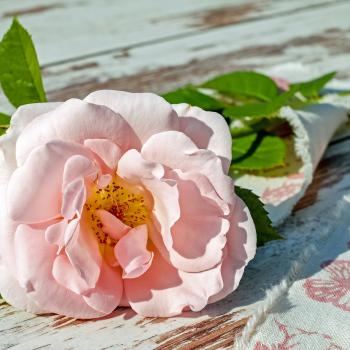So with her father’s blessing light upon her, she rode away beside the prince; and ever after, all her life was crowned with happiness as it had been written for her in the stars.
In part I of this series I offered some background to Annie Fellows Johnston’s 1904 short story The Three Weavers, and in part II the story began as three weavers—Herthold, Hubert, and Hildgardmar—who live side-by-side and have similar fortunes, bore three infant daughters—Hertha, Huberta, and Hildegard. At each girl’s christening, a fairy appeared and declared that the girl would marry a prince—if she could weave him a royal mantle.
In part III the three fathers took very different courses of action in introducing the magic looms and weaving—here an analogy for love and sex—to their daughters. Hertha shamed his daughter for asking about her loom, and she is now weaving in secret. Huberta’s father gave her her loom with a laugh, and told her to have fun with it however she pleased. Hildegarde’s father spoke seriously with her about her loom, giving it to her along with a silver yardstick and careful instructions.
In part IV the girls went about their weaving: Huberta gave out woven mantles hither and yon, to the shepherd boy and a passing troubadour; Hertha wove in secret, working on a mantle to fit a page she believed had a royal and princely demeanor; and Hildegarde wove with her father as her confidante, reminding her that a passing man and a wandering knight did not fully fit the yardstick he had given her.
At last it came to pass, as it was written in the stars, a prince came riding by to ask for Hertha as his bride. Old Herthold, taking her by the hand, said, ‘Now I will lead thee into the inner room and teach thee how to use the fairy’s sacred gift. With me for a teacher, thou canst surely make no mistake.’
When they came into the inner room there stood only the empty loom from which the golden warp had been clipped.
‘How now!’ he demanded, angrily. Hertha, braving his ill-humour, said, defiantly, ‘Thou art too late. Because I feared thy scorn of what thou wast pleased to call my childish foolishness, I wove in secret, and when my prince came by, long ago I gave it him. He stands outside at the casement.’
The astonished Herthold, turning in a rage, saw the long-haired page clad in the mantle which she had woven in secret. He tore it angrily from the youth, and demanded she should give it to the prince, who waited to claim it, but the prince would have none of it. It was of too small a fashion to fit his royal shoulders, and had been defiled by the wearing of a common page. So with one look of disdain he rode away.
Stripped of the robe her own fancy had woven around him, the page stood shorn before her. It was as if a veil had been torn from her eyes, and she no longer saw him as her fond dreams had painted him. She saw him in all his unworthiness; and the cloth of gold which was her maiden-love, and the rosy day-dreams she had woven into it to make the mantle of a high ideal, lay in tattered shreds at her feet. When she looked from the one to the other and saw the mistake she had made and the opportunity she had lost, she covered her face with her hands and cried out to Herthold, ‘It is thy fault. Thou shouldst not have laughed my childish questions to scorn, and driven me to weave in ignorance and in secret.’ But all her upbraiding was too late. As it was written in the stars, her heart broke, as broke the shattered mirror of the Lady of Shalott.
“That same day came a prince to Hubert, asking for his daughter. He called her from the garden, saying, gaily, ‘Bring forth the mantle now, Huberta. Surely it must be a goodly one after all these years of weaving at thy own sweet will.’
“She brought it forth, but when he saw it he started back aghast at its pigmy size. When he demanded the reason, she confessed with tears that she had no more of the golden warp that was Clotho’s sacred gift. She had squandered that maiden-love in the bygone years to make the mantles she had so thoughtlessly bestowed upon the shepherd lad and the troubadour, the student and the knight. This was all she had left to give.
“‘Well,’ said her father, at length, ”tis only what many another has done in the wanton foolishness of youth. But perchance when the prince sees how fair thou art, and how sweetly thou dost sing to thy lute, he may overlook the paltriness of thy offering. Take it to him.’
“When she had laid it before him, he cast only one glance at it, so small it was, so meagre of gold thread, so unmeet for a true prince’s wearing. Then he looked sorrowfully into the depths of her beautiful eyes and turned away.
“The gaze burned into her very soul and revealed to her all that she had lost for evermore. She cried out to her father with pitiful sobs that set his heartstrings in a quiver, ‘It is thy fault! Why didst thou not warn me what a precious gift was the gold warp Clotho gave me! Why didst thou say to me, “Is this the lad? Is that the lad?” till I looked only at the village churls and wove my web to fit their unworthy shoulders, and forgot how high is the stature of a perfect prince!’ Then, hiding her face, she fled away, and as it was written in the stars, her heart broke, as broke the shattered mirror of the Lady of Shalott.
“Then came the prince to Hildegarde. All blushing and aflutter, she clipped the threads that held the golden web of her maiden-love, through which ran all her happy girlish day-dreams, and let him take it from her. Glancing shyly up, she saw that it fitted him in all faultlessness, as the falcon’s feathers fit the falcon.
“Then old Hildgardmar, stretching out his hands, said, ‘Because even in childhood days thou ever kept in view the sterling yardstick as I bade thee, because no single strand of all the golden warp that Clotho gave thee was squandered on another, because thou waitedst till thy woman’s fingers wrought the best that lay within thy woman’s heart, all happiness shall now be thine! Receive it as thy perfect crown!’
“So with her father’s blessing light upon her, she rode away beside the prince; and ever after, all her life was crowned with happiness as it had been written for her in the stars.”
I’m going to come right out and say it: These princes are jerks, and Hertha and Huberta are well rid of them.
I mean, the one prince sees that Hertha has woven a mantle fit for the page she loves, and given it to him, and he responds by giving her a look of disdain? Who does he think he is, anyway? I get that the author of the story is trying to portray Hertha’s page as unworthy of her, but honestly, he comes off loads better than the prince. I vote she stick with her faithful page rather than rejecting him because she just realized she might have ha a trust fund baby. And Huberta, for her part, has had enough relationship experience by now that she shouldn’t have a problem finding a loving life partner, once she gets over the insult paid her by an uppity trust fund baby—it’s not like she’s been kept locked in a closet and has no idea how to meet guys, after all.
And then there’s Hildegarde. Notice the words used to describe her reaction to the prince—“blushing” and “aflutter” and “glancing shyly up.” These are not signs of a mature relationship. I mean, for goodness sake, she has only just met the prince! She doesn’t actually know him! In practice, what happened here was that her father, Hildgardmar, designed a yardstick of proper characteristics and chose her husband for her. This is what I was raised to expect. The roles played by Hildegarde and her father are exactly those outlined by leaders of the Christian Patriarchy movement and the “courtship” ideal. And given that she has never been in a relationship with anyone before, and given the has just been presented by her father with an approved beau whom she is told will bring her all happiness, of course she’s all aflutter and blushing and shy! It’s no wonder I read this section as so realistic when I was a teen—it was what I’d been taught to long for and expect.
I’m glad I went back through this story. It’s helped me clarify my feelings about The Three Weavers, which I first read more than ten years ago, and which had a significant impact on my relational development. I now understand that part of why I felt such an attachment to this story is that it perfectly fit with the other things I was taught, and especially with Joshua Harris’ I Kissed Dating Goodbye. The messages in this story were the stuff of my girlhood. I suppose I now wish I could travel into this story and tell Hertha, Huberta, and Hildegarde that there is more to their lives than who they marry, and that rather than sitting around at home waiting for life to come to them they should go out and seize it themselves. Maybe we would run away together, we four. Perhaps I should write a fanfic. After all, I already know who the villains would be (hint: it starts with “p” and ends with “rinces”).














